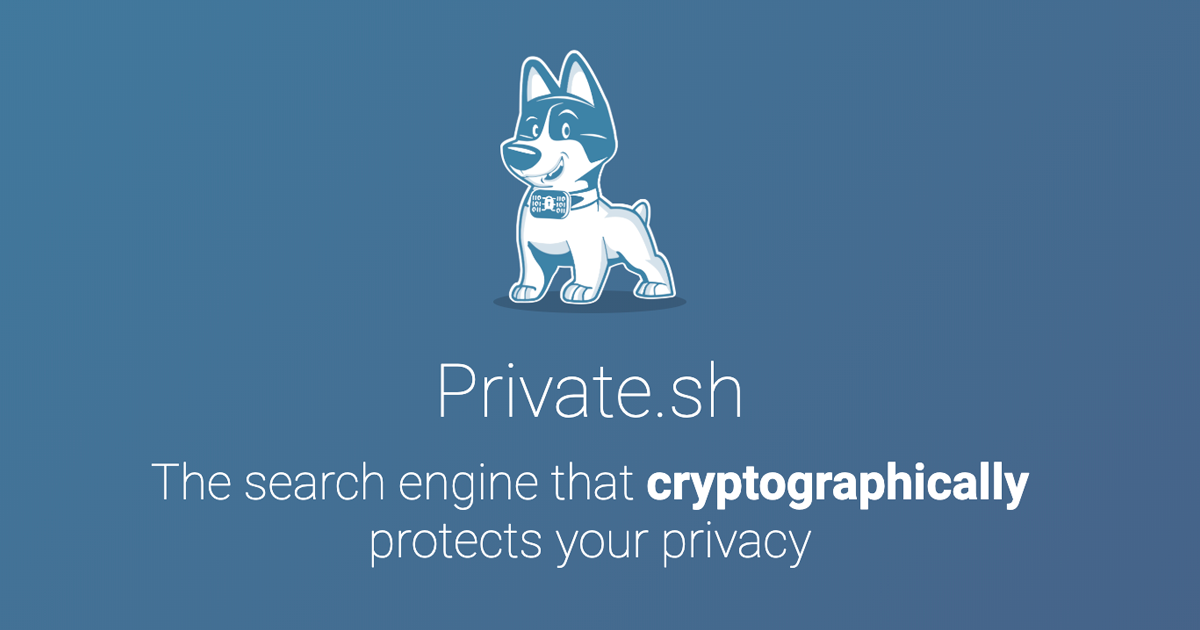Introducing Private.sh: A search engine that cryptographically protects your privacy

Private.sh is a new private search engine that uses cryptography to ensure that your search history cannot be tracked by anyone – even us. Private.sh comes from the same privacy committed makers of Private Internet Access in partnership with GigaBlast – one of the few companies to have their own index of the internet available for search.
This first truly private search engine is possible thanks to the partnership, with each partner playing a key part of the puzzle to provide a new standard for cryptographically secured privacy for search engines.
Chances are, your current search engine is not private
One of the core functions and business models of a search engine is tracking searches and who makes them. The vast majority of search engines are taking personally identifiable information like your IP address and browser fingerprints to create or add to a profile. Besides keeping a log of what you’ve searched for, non-private search engines also keep a log of what result you clicked on, how long it took, whether you were feeling lucky, etc.
With non-private search engines, being able to identify you – the searcher – and tie your search terms to your user profile while targeting advertising at you is all an essential part of the business model.
That is to say, with normal search engines, your search’s privacy is ignored and trampled on by design. With Private.sh, your privacy is protected by design.
With Private.sh, your search privacy is protected with both encryption and anonymity.
When you enter a search term into Private.sh, the search term gets encrypted on the client side (on your computer or device) using GigaBlast’s public key, which only they can decrypt. In effect, this ensures that Private.sh never sees the search term.
After the search term is encrypted, it is passed to the GigaBlast search engine through a Private.sh proxy so GigaBlast doesn’t see your IP address, browser fingerprints, or anything that would allow for your privacy to be broken or a user profile to be created. This means that neither Private.sh or GigaBlast is able to build a user profile on you or store your search history.
Finally, the search results are encrypted by GigaBlast using your temporary public key and are returned to you through the Private.sh proxy. The results then get decrypted and rendered locally on your device using Javascript with a temporary private key that only exists on your device. This client-side keypair is changed for every search request.
With this multi-pronged approach, Private.sh is the perfect option when you need to search something privately.
Private Search is finally here, and improving
Another benefit is that since Private.sh and GigaBlast are both unable to build a user profile on you, you’ll be able to get unbiased and private search results every time. You may notice that these results aren’t as accurate or algorithmically tailored to you based on your search history. This is by design and makes Private.sh a perfect complement to your favorite search engine, for when you want to make a search that is truly private.
We will constantly be working to better your search experience without compromising your security. In the future, Private.sh will be working with GigaBlast to expand their index of the internet to bring more results. Private.sh is determined to be your private search engine of choice.
Try private search out and add it to your privacy toolkit today.
Comments are closed.

I like the concept, but testing it out the results are not very good. PIA will need to be able to show a real user advantage to this service vs. using something like DuckDuckGo or Startpage. The advantage of those services is they produce better results because they’re taking from Bing and Google’s indexes but serving the results privately. The Gigablast index it seems can’t match that accuracy. And you can say that users have to trust DuckDuckGo, etc., but really that is no different than trusting PIA for VPN services. Also, client-side browser encryption is a two edged sword. It MAY be more private, its also a lot more vulnerable to hackers than server-side encryption. I guess I’d rather PIA spend more time developing new VPN features rather than entering the search engine space.